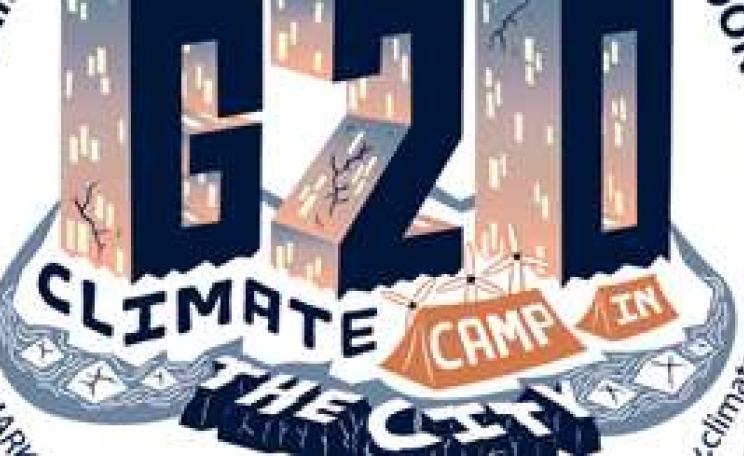The Camp for Climate Action is not illegal. Everyone is welcome. So why did some newspaper headlines report on Monday that: “BAA wins Heathrow protest injunction”? With both sides claiming victory in last week’s High Court battle between BAA, the owner of Heathrow airport, and the climate change demonstrators planning to converge on the airport next Tuesday, what is the truth behind the spin?
My verdict – BAA were trounced; their injunction win against the protestors was no such thing.
Mrs Justice Swift awarded BAA an injunction preventing anti-aviation direct action group Plane Stupid and other protestors trespassing on the Heathrow site and disrupting the operation of the airport this August. Martin Bullock, the Managing Director of BAA Heathrow, said after the injunction verdict that BAA got what it wanted: “This injunction has never been about stopping lawful and peaceful protests”. BAA claims that their intention was to stop climate campaigners continuing a campaign, first popularised at Drax power station, in Yorkshire, during the first Climate Camp, to shut down the country’s biggest emitters of greenhouse gases. Numerous groups staged similar actions in the months following, including Plane Stupid, who famously blockaded a runway at Nottingham East Midlands airport.
If BAA merely intended to ban activists from civil disobedience, they won the court case. But BAA’s injunction proposal – I have version seven of thirteen drafts – doesn’t seem to be written with this in mind. To many, it looked like BAA wanted an order making the Camp for Climate Action illegal. Banning the camp would stop an event seeking: “grassroots solutions to climate change through workshops, skill-sharing, education, debate and entertainment”, by forming: “a space for celebration, for kids and families, a place to socialise with friends old and new”. Direct action is only one aim of the camp.
The draft order didn’t ban the camp – it barely mentions it. But it was so broad that anyone likely to attend the climate camp would have been included and most law-abiding campaigners would have steered clear. The injunction proposals covered four groups: HACAN ClearSkies, Plane Stupid, AirportWatch and NoTRAG. AirportWatch is an umbrella group representing 5 million people from environmental organizations as mainstream as the Campaign to Protect Rural England.
Once the scope of BAA’s injunction became public, it was a PR disaster for the company already facing the prospect of being broken up by the Competition Commission as a solution to its near monopolistic status.
As opposition grew outside the courtroom, BAA was humiliated inside it - the draft injunction was redrafted twelve times and the court proceedings descended into confusion. Even Timothy Lawson-Cruttenden, BAA’s lawyer, admitted to the court that the company had: “got off on the wrong footing”. On day one of the court hearing, the judge declared that she belonged to three of the organizations in AirportWatch before sending BAA away to redraft their application for a court order to clarify who they were trying to injunct. The following day, BAA dropped the sections of the court order banning activists from roads, railway and tube lines leading to Heathrow after Transport for London (TfL) heard about the court hearing on the radio and attended court to object. Martin Chamberlain QC, TfL’s lawyer, said that the failure to consult TfL, who manage Central London transport, before preparing the injunction was “extraordinary”. Even three days into the hearing, the judge was still confused about how the BAA’s proposals would help policing on the ground.
Civil liberties campaigners were also up in arms when it became clear that BAA was seeking an injunction with no end date, and that they were seeking to criminalise anyone who caused ‘anxiety and inconvenience’ to Heathrow passengers or staff under the 1997 Harassment Act, a law to protect people from stalkers.
Mrs Justice Swift’s verdict left BAA with a month-long injunction that Martin Chamberlain described as “unrecognizable” in its ‘width and breadth” to that sought. She struck all groups except for Plane Stupid out of the injunction, and one of the four named defendants – NoTRAG Chair Geraldine Nicholson. She said there was no evidence Mrs Nicholson had ever been involved in civil disobedience and it was “regrettable” that she had been named in the injunction in the first place. She also threw out BAA’s proposal to injunct under the Harassment Act, ruling that “being annoyed about the delay on a train”, did not constitute ‘harassment’. In a final blow to the company, BAA was ordered to pay the full legal costs of everyone except Plane Stupid.
The judge had pared down BAA’s injunction so thoroughly that the company had to rewrite it during Monday lunchtime and bring it back to the court in the afternoon. So why the headlines?
Despite its defeat in court BAA was first to the press, briefing journalists on its ‘success’. The bait was swallowed. The headlines were “BAA wins Heathrow protest injunction”. The reality was anything but.
This article first appeared in the Ecologist August 2007





